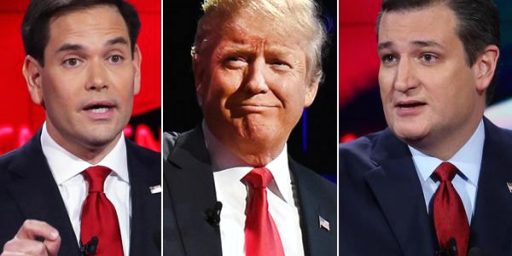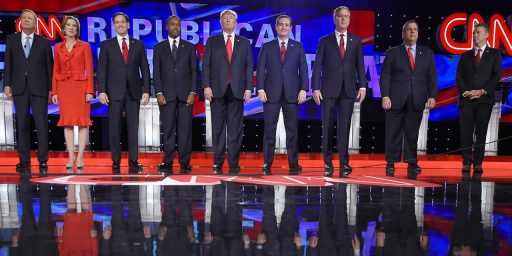Cruz Challenges Campaign Finance Law
Is a contribution after an election different from one during an election?

NPR:
At issue was a provision of the 2002 Bipartisan Campaign Reform Act, which bars election winners from raising more than $250,000 after an election to repay loans the candidate has made to their own campaign.
Cruz has stipulated that he deliberately set up the facts of this case in order to test the provision. The day before the general election, he lent his campaign $260,000 — $10,000 more than the law allows him to be reimbursed with post-election contributions. At the time, he had more than $2.4 million in campaign cash on hand that he could have used to pay off the loan.
Instead, he filed suit, charging that the $250,000 cap on using post-election donations for loan repayment is unconstitutional. Cruz argues that the limit burdens his First Amendment free speech rights because it restricts his ability to be reimbursed after the election. The Federal Election Commission counters that money given after an election has a potentially corrupt purpose.
The argument fell along predictably ideological lines, with the court’s six conservatives signaling support for Cruz and the three liberals indicating that they would defer to Congress’ judgment — namely that using post-election contributions to pay off a debt could lead to quid pro quo corruption.
As Justice Elena Kagan put it, if a contributor wants to help out with a loan repayment, “One day I had a $10,000 loan. I’m $10,000 richer. Somebody just made me a $10,000 gift.”
Justice Amy Coney Barrett, however, saw things differently. “This doesn’t enrich him personally because he’s no better off than he was before,” she said. “It’s paying a loan, not lining his pockets.”
Justice Brett Kavanaugh suggested the limit would chill Cruz’s speech. As he put it, “The choice is to spend that without any possibility of getting it back or not spend it at all.”
Representing Cruz, lawyer Charles Cooper contended that Congress didn’t see post-election contributions as necessarily corrupt. There are “reasons enough for a contributor to come after an election and make a contribution to the winner,” he contended.
“You’ve just said the magic words,” interjected Sotomayor. “To make a contribution to the winner — not to the campaign, but for the pockets of the winner — that’s a very different corrupting influence.”
My guess is that Cruz will win here because SCOTUS has been hostile to campaign finance laws going back to Buckley v. Valeo (1976), not because he’s a Republican. Aside from the contrived controversy here, I think Cruz is also right on the merits.
To the extent campaign spending is a means of speech in our era—a controversial issue but, again, one with judicial precedent going back nearly half a century now—it’s hard to see how a contribution made to a re-elected Senator after the campaign is different from one to a sitting Senator during the campaign. To the extent he’s going to be favorably disposed to those who give him money—and let’s not kid ourselves, he is—why does the timing matter?
To the extent that repayment of personal loans to the campaign is different from simple donations to the campaign—and I’m persuadable that it is—then it’s not obvious why $250,000 is the magic number. For most of us—granted, not most US Senators—that’s a considerable chunk of change. Are we to believe that Senators are agnostic at the $250,000 mark but corruptable at $260,000? Further, to the extent a cap makes sense and any cap is artificial, wouldn’t it make sense to cap the amount any individual donor or group can donate to retiring that loan rather than an overall amount?
The counter, which is not entirely unreasonable, is that it’s the job of elected officials, not judges, to make these policy distinctions. But, having declared campaign money to be a form of free expression and thus protected by the First Amendment (“Congress shall make no law….”) it seems reasonable to apply strict scrutiny to laws that infringe said speech.





It’s not, actually:
I get that you desperately don’t want to see SCOTUS as a lawless court. But because of this, you’re effectively OK with getting rid of the existing limits on political bribery because those limits were already weak to begin with:
You’re literally OK with facilitating corruption:
It’s no coincidence that the Republican judges were vetted, approved and then put forward by the Federalist Society before they could nominated. They literally owe their seats on the Supreme Court to a secretly funded entity, entirely dependent on morally reprehensible donations. It is widely assumed that the funding for all their activities comes from a relatively small number of billionaires who frequently have business interests before the court. And these activities include paying for “like minded” lower level judges to attend seminars at luxury resorts, all expenses payed, where they are lectured to about the proper role of judges.
And FWIW, the proper response should have been to prohibit candidates or their family members lending their campaigns money or, as a weaker measure, not allowing interest on any loans made.
@drj: I agree with you and @MarkedMan that the described loan scheme is shady. But candidates spending on their own campaigns was the original nose under the camel’s tent in Buckley. Our whole campaign financing system is essentially corrupt but campaigning is incredibly and increasingly expensive.
The problem is there there is an epic failure to understand the role of money in US politics. Money does not = speech. Almost all free speech conflicts are over content. What you can and can’t say under the law. Campaign finance is the only exception. Money doesn’t buy content, it buys eyeballs, it buys attention. And I can’t imagine the founders saying that every person in the US get to have an equal amount of attention for their speech. When do I get 30 seconds during the Super Bowl?
I’m struggling to understand why people from outside a district or state can even contribute to a campaign for representative they can’t vote for. If the reason is because those people will create policy that affects all of us, then we should all damn well get to vote for them too. So you get to bribe politicians that you can’t vote for. That seems about as counter to a functioning democracy as you can get.
I don’t think it’s one bit reductionist to say that we basically have legal bribery in the country. and more then any other issue, whether it’s gerrymandering, the filibuster, or the electoral collage, our crazy ineffectual campaign finance laws are going to be the think that ends the American Experiment in self-rule, because donors matter more then voters.
@James Joyner:
Each of these factors of campaign financing perpetuates the other.
@James Joyner:
“The situation is shit, therefore we must make it shittier,” doesn’t strike me as a particularly convincing legal philopshy.
This is one of those situations where the law fails to deal with on-the-ground realities. It seems absurd to claim that a Senator or Congressperson has their freedom of speech suppressed or restricted when they have the right to speak up at any time on the floor of Congress, with extensive legal protection. That’s an advantage the average Joe or Jane lacks.
@Rick DeMent:
The Court said otherwise in Buckley, and that’s what we’re working off of. Whether that should or should not be the case is another discussion entirely, but–for now and probably for the foreseeable future–political contributions are equated to political speech.
@Rick DeMent: @SC_Birdflyte: Again, this is all settled law that literally predates the formation of the Federalist Society or the tenure of any current SCOTUS justice. [It’s notable that the meat of the Buckley decision was decided 8-0, although there were multiple concurrence and partial dissents.] The courts have concluded that, in a modern communications age, spending money on television and radio ads is the most effective way to speak to the public. Nobody is guaranteed a platform but Congress can’t infringe on the right to secure one.
So, for example, the owner of the local television or radio station—or a popular radio or TV host—has a huge advantage in getting their message out to the public. Congress couldn’t pass a law denying those people the right to run for office or requiring them to sell their stations or give up their shows as a condition of running for office.
@Rick DeMent:
But even if it were, it doesn’t really matter.
“Freedom of speech” doesn’t mean that there can be no restraints whatsoever on speech. The right to freedom of speech is not absolute – not according to US Constitutional jurisprudence, at least.
Speech can, in fact, be prohibited – as long as the prohibition would be proportional to the societal harm inflicted by such speech.
If certain forms of “speech” would basically amount to bribery, then sure as hell a court could say that prohibiting those forms of speech would be fully Constitutional. For the simple reason that the societal harms of the resulting corruption would clearly outweigh the benefits of the freedom granted to the “speakers.”
It’s just that the current hacks on SCOTUS would never do so because that would make their donors sad.
@drj: Again, there’s 46 years of case law long predating the “current hacks” that disagrees with you.
@drj:
So was corporate cash in politics until Citizens United. You could say the same thing about separate but equal. For that matter you could say the same thing about Rowe V Wade but that’s going on the ash heap of president very soon here. There is a long list of things that was “settled law” until it wasn’t and the idea that bad ideas should be set in stone is literally the roadmap to authoritarianism. And I don’t think that is reductive either.
Sorry precedent not president 🙂
@James Joyner:
Dude, now you’re just being disingenuous.
So for two decades absolutely noone managed to notice that Congress had promulgated clearly unconstitutional legislation?
And it’s just a totally random coinicidence that only after the GOP has managed to pack SCOTUS that a relevant suit is being brought?
FFS
@drj: I’m not saying that this particular narrow question of the $250,000 limit is settled law but rather the broader issue of money=speech.
Why Cruz decided to challenge this particular provision is beyond my ability to guess. It’s clearly a stunt, in that he didn’t need to take a loan. But I don’t think it’s part of some elaborate scheme for him to line his pockets.
@James Joyner:
But even that isn’t (clearly!) as straightforward as you pretend.
Because if money=speech there would be no legal difference between me trying to convince a sitting member of Congress with words or with money.
I think we can all agree that Federalist Society hasn’t managed to corrupt the courts to that extent quite yet.
@James Joyner:
My guess? He wants his name on a Supreme Court case.
This provision–as you note–feels very arbitrary and is ripe for overturning. He’d love to see his name in books as Cruz v. FEC.
@Jen: That’s a plausible guess!
@drj: I’m not pretending that every aspect of the issue is settled. And I think I read your quote of @Rick DeMent “Money does not = speech” as your making that assertion. I agree that all of the cases have some balancing of societal interests component—although the tendency has certainly been in the direction of expanding the Buckley precedent than expanding the concept of societal harm.
@James Joyner:
I understand that Money = speech has been around for a long time. But the logic of it fails under even the most casual scrutiny. But how far would I get under law if I argued that my inability to raise money entitles me to some sort of stipend or else my freedom of speech is being curtailed. They would say I’m barking mad.
That money does not buy speech not “an assertion”, it’s a fact. Money does not, in any way shape or form “buy speech”. It literally buys an audience. Speech, in law is almost always about it’s content, except for this one carve out that is ridiculous on it’s face and a horrible bit of jurisprudence that people seem to go along without questioning.
That’s my point, this particular point of law is based on a premise that is untrue and makes no sense. What politicians use money for is to buy advertising, to finance campaign rally’s, to hire staff to administer all of the above. If you cut out all the things that money buys a politician that is not directly about buying a “cost per thousand” of eyeballs or setting up, traveling to, and administering the business of campaign rallies and event’s what do you have left? About the only thing that comes under that is financing fund razing events to spend more money on the other two.
Long ago and far away I was taught in junior high and HS Civics classes that free speech meant I could say what I wanted (short of incitement) and the government couldn’t put me in jail for it. That seems necessary and sufficient.
@Jen: I think we all feel confident that Ted Cruz is not acting out of principle. My guess would be Cruz is knowingly, and for remuneration, acting as a cat’s paw for the Koch Bro or some other sponsor.
@James Joyner:
And the results are before us.
Although by the nature of dark money it’s hard to be sure of anything, it appears the Ds are catching up with GOPs on both campaign and dark money. Why do I have the feeling that if Ds go well ahead, many conservatives will suddenly always have believed money =/= speech?
@gVOR08: Oooh, good thought. Probably both. He challenges the $250K limit, which helps the moneybags donors, AND he gets his name on a case that will be studied in law school.
Here’s the hypothetical running through my head with all of this.
Candidate A has a Friend who owns a small bank. A would like to get elected. Friend would like him to get elected and, lets expand this out a bit, Donor would like A to get elected. Maybe A’s got some money, but not a ton. A loans his campaign a million dollars at 10% interest, even though he doesn’t actually have a liquid million floating about. So, instead, Friend’s bank loans him the million at say, 4% interest. To cover the loan and to keep everyone happy, secure and capitalized, Donor deposits a million or so into the Bank.
A wins and very slowly over the course of his term (or terms) uses campaign donations to pay off the loan. The interest enriches both him and the Friend.
How is this not a direct bribe from the donor to the candidate.
And before you saw this would never happen. My Alderman is almost certainly going to jail for something fairly similar. Oh, and a guy blew his own brains out over this.
https://abc7chicago.com/bridgeport-bank-alderman-patrick-daley-thompson-chicago-city-council-news/11463449/
@James Joyner:
This is Ted Cruz we are talking about. Hubris and lining his pockets are kinda his shtick.
Edit,
I got my local high profile suicides wrong. The Banker in the Thompson case hung himself. I’m was thinking of the connected mob plumber/informant that suicided himself. Sometimes this neighborhood gets too wild.
Playing Gunga Din to Ted Cruz in the role of memsahib? Meh, not a good look, IMO.
Money equals speech…corporations are people…gerrymandering is not in their remit…like I’ve said elsewhere, the Supreme Court has become nothing but an abstract ivory tower debating society incapable of understanding (or even thinking they SHOULD understand) the real world consequences of their decisions. It’s been a long slow decline (as noted, you can’t blame the current court for the disastrous Buckley decision, though you CAN blame them for not thinking that’s one of the decisions where stare decisis maybe shouldn’t apply), but it’s hard to see this country existing much longer with a legislative branch in full failure mode, a judicial branch approaching the same (arguably already there, though the rot hasn’t extended all the way down yet but it’s certainly started at the top), and an executive branch getting more and more power by default as the other branches refuse to do–or even understand–their jobs.
God I wish I could afford to retire and go somewhere else.
@James Joyner: you’re right, it isn’t part of an elaborate scheme for him to line his pockets.
I am going to be that guy and admit to not reading all the replies before jumping in with my 2 cents (but I did read James’ post in full), and being pretty clueless about campaign finance intricacies, but what would stop a Democratic party member from pulling a Ted Cruz if this passes?
I wonder if that might be the only thing that causes the Supremes to pause and actually put some thought into this, maybe even more thought than they have been putting into their Covid mask mandate ruling(s) (at least hope springs eternal). As this seems like something that very much would be abused by both sides if it passes muster from the highest court in the U.S..
@Just Another Ex-Republican:
The decline began when it became a prerequisite that SC nominees needed to previously been appeals court judges and that preferably they matriculated from a small number of law schools. I.e. Harvard, Yale and Princeton. Mix in the later development of giving great weight to review of the nominees credentials to organizations beyond the bar association and we end up with an institution that often sounds like a drunken late night debate in a dorm lounge.
We no longer get David Souter’s or Sandra Day O’Connor’s who careers weren’t defined by being on the federal bench before arriving at the SC.
Is she genuinely stupid, or just pretending?
I’d assume just pretending because this is pretty stupid, but some people are amazingly stupid.
So, a week before the election, I make my campaign a loan of a million bucks, because I’m Mr. Bigbucks and I can do that. I charge the campaign 10 percent annual interest.
I continue to fundraise and after a year, pay myself back. I’ve just made 10,000 bucks for nothin’ You can’t get interest rates like that on any note of any kind, no matter how shaky, but this one’s as solid as a rock. You just siphoned 10K from the campaign into your own pocket. Which you can use to do anything you want, whether that’s hookers and blow or trips to Cancun during a cold snap. That doesn’t really seem like what campaign contributions are for, does it?
If your intention, James is to predict what is legal, then yeah, I think you’re right. But that behavior is very questionable. I mean, what would people be saying if it were the Clintons bringing this suit. Honestly, I wish they were, because that would be entertaining, to say the least.
@Gustopher: Apparently Justice Barrett is unfamiliar with the concept of interest.
@Jay L Gischer: Even at zero interest, paying off someone’s loan is basically handing them money.
@Gustopher:
Well, it’s not like there are industries based on making loans and charging interest.
Not exactly. Fundraising is a major PITA.
It costs campaigns a fair amount of money TO fundraise. That $10K you’ve “raised” in interest is going to be well and truly surpassed by the postage, website, credit card fees, and–the costliest–fundraising events.
You also have to pay someone to do all of this work, and have a treasurer to keep track of all of the fundraising and reporting requirements. For a US Senate race, you’re probably talking salaries for a fundraiser in excess of $85K/year, who has 1-2 junior staff making $40K/year, along with whatever you’re paying your bookkeeper.
It might SEEM like candidates just get money thrown at them, and yes it’s easier for an incumbent to raise money than a challenger, but that’s simply not accurate.
@drj: This is what happens when people that are generally honest rationalize the necessity of white collar type regulation. They have no idea how foxes think and what they are capable of–so of course it makes no sense.
To a hen—it makes no sense that the hen house fence should extend 4 feet under the surface. After all, chickens don’t live underground.
@Sleeping Dog: Absolutely–lack of Diversity of life experience on the Court is really astounding. Once could make the same argument of Congress. Imagine if it were mostly plumbers, or IT professionals.
When any organization becomes a monoculture–a shit show is not far behind.